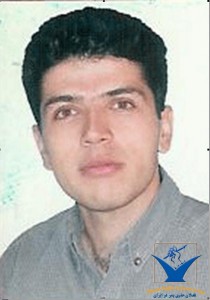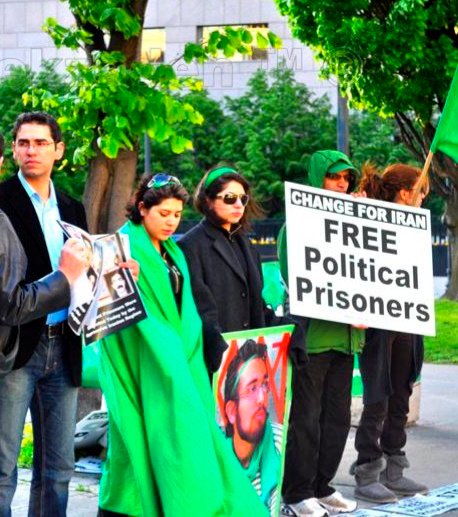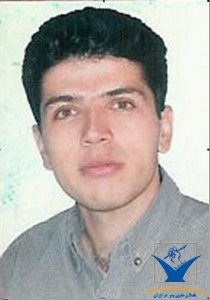Iran Document: Maziar Bahari's Response to His 13-Year (and 74-Lash) Sentence
 Tuesday, May 11, 2010 at 16:43
Tuesday, May 11, 2010 at 16:43  On Monday a Revolutionary Court in Iran sentenced Iranian-Canadian journalist Maziar Bahari, in absentia, to 13 years and 74 lashes. Bahari, detained just after the June election until October, offers this response:
On Monday a Revolutionary Court in Iran sentenced Iranian-Canadian journalist Maziar Bahari, in absentia, to 13 years and 74 lashes. Bahari, detained just after the June election until October, offers this response:I didn't attend my sentencing. In June last year, I was thrown into prison in Iran for 118 days, then finally released and allowed to leave the country in October. But on May 9, 2010, without bothering to inform me or my lawyers, Branch 26 of the Revolutionary Court sentenced me to 13 years and six months imprisonment plus 74 lashes. A member of my family went to the court just this morning and was told of the judgment, such as it was: a reminder that this is a regime that deals in brutal symbols that make sense only to its own.
The Real Threat to Iran: The Spies of the Daily Show
Iran Video & Text: Maziar Bahari on His 118 Days in Detention
The Latest from Iran (11 May): Opposition Surfaces
You may say, "Thirteen and a half years is already a harsh sentence, why do they need to flog you as well?" My guess is that they hate the idea you might come out of jail unscathed, and relish the notion they could leave marks on your body that you could never forget—if you were there to feel them. Or perhaps in a perverse way the sentence is meant to win my gratitude. On the day they let me out of prison last year, the resident judge in Tehran's notorious Evin prison told me that there were 11 charges against me. So in a sense, as I was reminded repeatedly during almost four months of interrogation and torture, I was benefiting from "the Islamic kindness" of the "holy" government of the Islamic Republic when I got out.
The six charges I was sentenced for and the reason for the sentences, as my interrogator and the resident judge told me, are as follows, and they will tell you more about the regime than about me. I was, after all, just doing what a reporter does. But like the interrogators in George Orwell's 1984, those at work in Iran's justice system today are not interested in having you tell the truth, they are intent on making you accept their truth:
Five years imprisonment for unlawful assembly and conspiring against the security of the state. I reported about four days of peaceful demonstrations after the presidential election in June 2009 when millions of Iranians came to the streets to oppose the reelection of President Mahmoud Ahmadinejad.
Four years for collecting and keeping secret and classified documents. In 2002 a leader of the opposition group Freedom Movement of Iran gave me a court document about the arrest of members of his group. There was nothing secret in the document. Everything in it was later announced by Iranian judiciary officials. The Revolutionary Guards who raided my mother's house to arrest me found the document in one of the boxes they confiscated. I was never interrogated about it and it was only mentioned once during 118 days of interrogation.
One year for propagandizing against the system. In a series of articles for NEWSWEEK after the presidential vote I quoted members of the opposition who said Ahmadinejad's reelection was tantamount to a military coup: that it tightened the grip of the Revolutionary Guards over Iran's military, political and economic affairs. The Guards also took over the intelligence apparatus. After they arrested me, they said that by reflecting the views of the opposition groups I was staging a media campaign against the Islamic Republic.
Two years for insulting the Supreme Leader. In a private e-mail to my NEWSWEEK editors Nisid Hajari and Christopher Dickey, I said that Iran's Supreme Leader Ayatollah Ali Khamenei has learned from the mistakes the Shah made when he was overthrown by the Islamic revolution in 1978 and 1979, and Khamenei ould not allow his opponents to act so freely. I mentioned that Khamenei tries to nip the opposition in the bud by arresting its leaders and preventing people from coming to the streets. The agents of Khamenei who tortured me for months said that by comparing the ayatollah to the shah I was implying that Khamenei was a dictator, and that calling him a dictator was an insult.
One year and 74 lashes for disrupting public order. On June 25 I reported at a demonstration in Tehran that led to a clash between the paramilitary Basij forces and a group of young people who attacked a Basij base. I filmed the attacked and wrote about it for NEWSWEEK. I was told that reporting the incident incited the public to rise against the government.
And, finally, the real icing on the cake:
Six months for insulting the president. Someone tagged a photo of a young man kissing Ahmadinejad so that it appeared on my Facebook wall. My interrogator said that the picture implied that Ahmadinejad was a homosexual and that it was an insult.
Strangely, no sentence was handed down for any of the more severe charges brought up when I was being interrogated and tortured. Those included spying for the United States, Great Britain, and Israel; paving the way for a "velvet revolution" in Iran like the peaceful revolutions that transformed Ukraine, Georgia, and Czechoslovakia; being in contact with Jews and Israelis; improper sexual conduct; and putting various reformist leaders in touch with Western governments.
None of those charges made any more or less sense than the ones I was sentenced for, so why leave them out?
I can write these lines with my tongue firmly in my cheek from the safety of my house in London, of course, but more than 30 journalists, writers, and bloggers are still languishing in Iran's prisons. Dozens of others are either out on bail or furlough and can be put in prison anytime the Revolutionary Guards desire. Hundreds of other Iranians are in jail for charges that are even more absurd than mine. Five activists were executed on May 8, and 25 others are on death row.
Since the disputed election last June, the regime has somehow managed to contain the public outcry against its injustices by passing preposterous sentences and saturating Iranian cities with the police and Revolutionary Guards. A wave of judgments like the one against me, coming on the eve of the first anniversary of the election, appears aimed at discouraging people from taking part in new mass demonstrations aimed condemning the reelection of Ahmadinejad and the repression that followed.
Whether the regime successfully preempts the demonstrations this time we will have to wait and see, but it cannot play this game forever. Its fantasy of justice, like its fantasy of democracy, and its fantasy of economic development is a farce. Iranians are too smart, and too hungry, for that. One way or another the future will belong to those who want to build their future in the real world.



